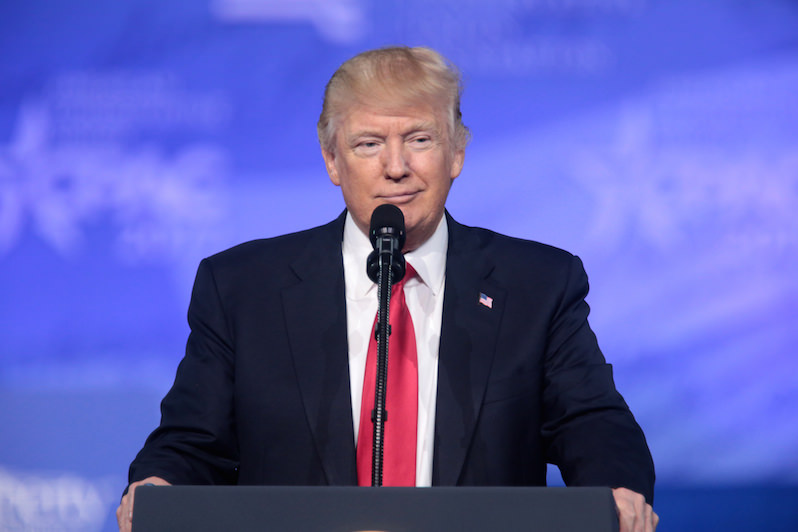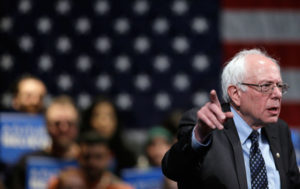Is It Fair to Label the President a Liar?
Vermont Sen. Bernie Sanders, who has done just that on Twitter, responds to a journalist’s challenge on the subject.
President Trump, speaking at the 2017 Conservative Political Action Conference. (Gage Skidmore / CC 2.0)
Is it fair to call the president of the United States a liar?
This is the question plaguing many journalists and politicians, who struggle to deal with the misinformation spread by President Trump and his administration on an almost daily basis.
Vermont Sen. Bernie Sanders recently took to Twitter to detail Trump’s lies to the public, after Trump accused former President Obama of wiretapping his phones:
President Trump cannot continue to lie, lie, lie. It diminishes the office of the president and our standing in the world. https://t.co/V8cRvX4ttv
— Bernie Sanders (@SenSanders) March 6, 2017
Trump said 3-5 million people voted illegally and that his victory “was the biggest electoral college win since Ronald Reagan.” Both lies.
— Bernie Sanders (@SenSanders) March 6, 2017
Trump said “it looked like a million and a half people” at his inauguration. Not even close.
— Bernie Sanders (@SenSanders) March 6, 2017
And Trump was lying long before he was president when he tried to delegitimize our first black president with the “birther” conspiracy.
— Bernie Sanders (@SenSanders) March 6, 2017
The United States will not be respected or taken seriously around the world if @realDonaldTrump continues to shamelessly lie.
— Bernie Sanders (@SenSanders) March 6, 2017
Amber Phillips of The Washington Post was displeased with Sanders’ choice of words and argued that the series of tweets highlights the “sorry state of political discourse right now.”
This is the state of our political discourse right now. Political norms — like, don’t accuse the president of the United States of lying without evidence, or don’t accuse the former president of the United States of wiretapping your phones without evidence — have been eviscerated. There are no rules right now in politics about what you can/can’t or should/shouldn’t say. …
Here’s the problem with using the “L” word in politics, though. To say someone’s lying suggests that you know they don’t believe what they’re saying.
She continues, noting that “it’s possible Trump believes the allegations he’s making” and “that is why we in the media are careful not to call Trump a ‘liar.’ ”
Sanders expanded on the debate in an essay published on Medium, in which he begins by referencing Phillips’ criticism.
Sanders writes:
I find it interesting that Ms. Phillips did not take issue with my facts. Her complaint appears to be that it is improper for a United States senator to state the obvious. And that is that we have a president who either lies intentionally or, even more frighteningly, does not know the difference between lies and truth.
Noting that he and Trump regularly have “strong policy disagreements,” Sanders explains that his choice of the word “lie” goes beyond the normal political process. He concludes:
But how do we deal with a president who makes statements that reverberate around our country and the world that are not based on fact or evidence? What is the appropriate way to respond to that? And if the media and political leaders fail to call lies what they are, are they then guilty of misleading the public?
As of Wednesday afternoon, Sanders’ essay has generated over 400 responses. We’d like to hear from our readers, too. Should we openly label Trump a liar and call out his “lies,” as Sanders has, or should we avoid the term out of respect to the office of the president?
Let us know in the poll below. One vote per person, please. (Make your selection, then click on “Vote.” To see results of the polling, click on “Results.”)
—Posted by Emma Niles
Independent journalism is under threat and overshadowed by heavily funded mainstream media.
You can help level the playing field. Become a member.
Your tax-deductible contribution keeps us digging beneath the headlines to give you thought-provoking, investigative reporting and analysis that unearths what's really happening- without compromise.
Give today to support our courageous, independent journalists.






You need to be a supporter to comment.
There are currently no responses to this article.
Be the first to respond.